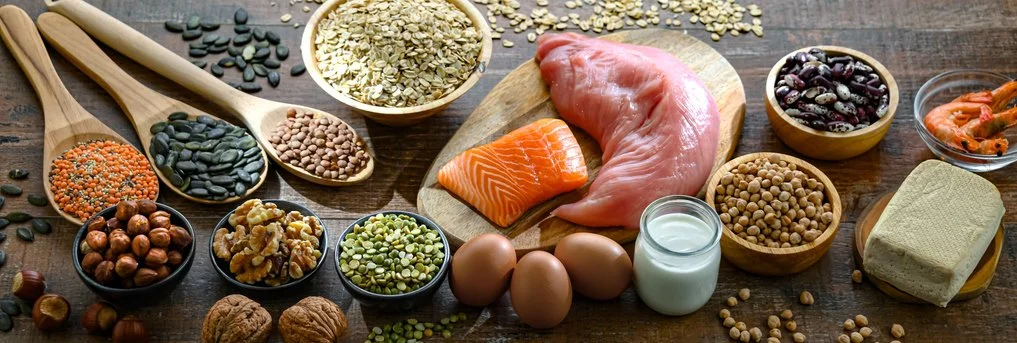Why Protein Matters More After 40
/Why Protein Matters More Than Ever After 40 — For Both Women and Men
As we age, our bodies go through profound changes — hormonally, metabolically, and physically. Yet one nutritional strategy remains critically underutilized and misunderstood: Adequate Protein Intake.
For both women and men over 40, consuming enough protein is essential for maintaining strength, hormone balance, mental clarity, and long-term vitality.
Let’s break down why protein is so much more than just a “fitness” nutrient — and why it's your ally in aging well.
How Much Protein Do You Really Need After 40?
Current research suggests that 1.2 to 2.0 grams of protein per kilogram of body weight per day is ideal for older adults that amount is far above the outdated RDA of 0.8g/kg.
To put that into perspective, a 150-pound person (about 68 kg) would need between 82 and 136 grams of protein daily.
That’s a significant shift from the guidelines and what many people are used to, but it's crucial for several key reasons.
1. Combatting Muscle Loss (Sarcopenia)
After the age of 30, we begin to lose muscle mass at a rate of 3–8% per decade, and that rate accelerates after 60. This condition is known as sarcopenia, and it’s a major driver of weakness, falls, and frailty in older adults.
Protein, especially when combined with resistance or strength training, helps stimulate muscle protein synthesis, preventing the decline in lean mass and preserving mobility and independence as we age.
Spread your protein intake throughout the day and include a high-quality source at every meal to optimize absorption and use.
2. Supporting Hormonal Health
For women over 40, the decline in estrogen during perimenopause and menopause disrupts many systems in the body — mood, sleep, weight, metabolism, and more. Estrogen also plays a major role in brain health, which helps explain why women account for nearly two-thirds of Alzheimer’s cases.
What’s the link to protein? Its amino acids are the raw materials for producing hormones and neurotransmitters like serotonin and dopamine. These regulate mood, sleep, appetite, and cognitive function.
For men, testosterone levels gradually decline with age, which can lead to fatigue, muscle loss, reduced libido, and mood swings. While protein doesn't directly increase testosterone, it supports lean body mass and metabolic health, which are important for maintaining hormone balance.
3. Bone Health Isn’t Just About Calcium
Estrogen declines in women and testosterone loss in men both impact bone density. While calcium and vitamin D get all the attention, protein is also essential for building and maintaining strong bones. It stimulates the production of IGF-1 (insulin-like growth factor), which plays a key role in bone formation.
High-protein diets are also associated with lower rates of fractures in older adults.
4. Metabolic Health and Weight Management
As we age, our risk of insulin resistance increases, especially for menopausal women and men with abdominal fat gain. Insulin resistance is a root cause of many chronic diseases, including:
Type 2 diabetes
Cardiovascular disease
Non-alcoholic fatty liver disease
PCOS (in women)
Protein helps stabilize blood sugar levels, reduce sugar cravings, and increase satiety, all crucial for preventing overeating and metabolic dysfunction.
5. Protecting Cognitive Function
Cognitive decline isn't inevitable, but diet plays a huge role in prevention. For both men and women, amino acids from protein support the creation of neurotransmitters that regulate focus, memory, and mood.
For women in particular, declining estrogen during menopause contributes to increased risk of memory loss and cognitive issues, sometimes called “menopause brain.” Protein can help mitigate this by supporting brain chemistry and cellular repair.
Prioritize Protein Daily
Aging well isn’t just about what we cut out of our diet, it’s also about what we consistently include. Protein is one of the most powerful, science-backed nutrients for:
Preserving muscle
Balancing hormones
Supporting bone health
Stabilizing blood sugar
Protecting brain function
Whether you're a woman navigating menopause or a man working to maintain energy and strength, the evidence is clear: protein needs to be a priority
What to start with:
Track your daily protein intake for a few days
Aim to include 25–35 grams of protein per meal
Choose high-quality sources: lean meats, eggs, Greek yogurt, legumes, tofu, whey or plant-based protein powders
Combine with strength training for maximum benefits
Tracy Farrell is an expert in gut health, thyroid, and endocrine issues. She has more than 20 years of experience in healthcare starting on the administrative side and then as a Functional Diagnostic Nutrition Practitioner and Integrative Health Coach for the last five years at Natural Endocrine Solutions. She has certifications in Small Intestine Bacterial and Fungal Overgrowth (SIBO & SIFO) and has coordinated wellness programs for clients with autoimmune disorders and thyroid issues such as Hashimoto’s and Graves’ disease. Most recently she received a Bone Density Certification from Functional Diagnostic Nutrition.




